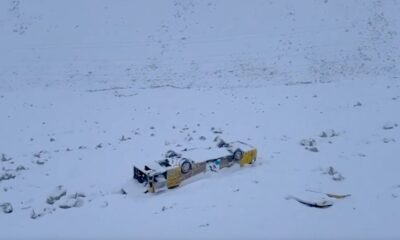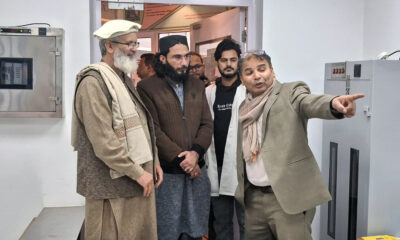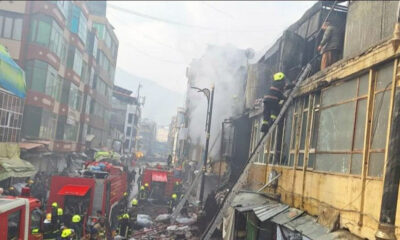World
In Beijing, Blinken meets Xi and raises US concerns about China’s support for Russia

U.S. Secretary of State Antony Blinken raised concerns on Friday about China’s support for Russia’s military, one of the many issues threatening to sour the recent improvement in relations between the world’s biggest economies.
Blinken raised the matter during five-and-a-half hours of talks with China’s top diplomat Wang Yi in Beijing, the latest high-level contact between the countries that have reduced the acrimony that pushed ties to historic lows last year.
The U.S. diplomat is due to wrap up his visit on Friday with little progress on a raft of contentious issues including U.S. complaints about cheap Chinese exports. Instead, both sides are focusing on pragmatic issues like people-to-people exchanges.
“The Secretary discussed concerns about PRC support to the Russian defense industrial base,” U.S. State Department spokesperson Matthew Miller said, adding the two sides also discussed Taiwan, the South China Sea and other flashpoints.
The PRC is short for China’s official name, the People’s Republic of China.
Despite its “no limits” partnership with Moscow, China has steered clear of providing arms for Russia’s war in Ukraine.
But U.S. officials warn its companies are helping the weapons industry with an unprecedented build up that has helped to turn the tide of the war. For example, bigger machine tool imports from China have helped Russia increase its ballistic missile production, they say.
The U.S. officials say such assistance risks hurting the broader bilateral relationship, even as ties stabilise after being hit by then-House Speaker Nancy Pelosi’s visit to Taiwan in 2022 and the U.S. downing of a suspected Chinese surveillance balloon in February 2023.
China has said it has not provided weaponry to any party, adding that it is “not a producer of or party involved in the Ukraine crisis”. However, it says that normal trade between China and Russia should not be interrupted or restricted.
STEADYING THE SHIP
In addition to his talks with Wang, Blinken met Chinese President Xi Jinping, who reiterated Beijing’s concerns that the United States was suppressing its economic development.
“This is a fundamental issue that must be addressed, just like the first button of a shirt that must be put right, in order for the China-U.S. relationship to truly stabilise, improve and move forward,” Xi said.
Earlier, Wang told Blinken that the “giant ship” of the China-U.S. ties had stabilised, “but negative factors in the relationship are still increasing and building.”
Wang also said the U.S. had taken “endless” measures to suppress China’s economy, trade, science and technology, equating such steps to containment.
“And the relationship is facing all kinds of disruptions. China’s legitimate development rights have been unreasonably suppressed and our core interests are facing challenges,” Wang told Blinken.
The agenda for the talks had been set during the November summit between Biden and Xi in San Francisco and a follow-up call in April.
Underscoring the growing discord between the two sides, hours before Blinken landed in China on Wednesday, U.S. President Joe Biden signed a bipartisan bill that included $8 billion to counter China’s military might, as well as billions in defence aid for Taiwan and $61 billion for Ukraine.
Wang said the U.S. must not step on “red lines” covering sovereignty, security and development interests – an apparent reference to Taiwan, the democratically governed island that China claims as its own, and the disputed South China Sea.
Other issues on the table include artificial intelligence and the U.S. push for progress on the curbing of China’s supply of the chemicals used to make fentanyl.
Blinken, along with senior U.S. officials focused on anti-narcotics collaboration with China, met China’s minister of public security, Wang Xiaohong, to discuss the fentanyl issue.
Ahead of Friday’s talks, U.S. Treasury Secretary Janet Yellen signalled that Biden was not taking any options off the table to respond to China’s excess industrial capacity.
Wang said that the U.S. should stop “hyping up” the “false narrative” of China’s overcapacity.
(Reuters)
World
US, Russian officials meet in Florida for more Ukraine talks
Kyiv says it will not cede land that Moscow’s forces have failed to capture in nearly four years of war.
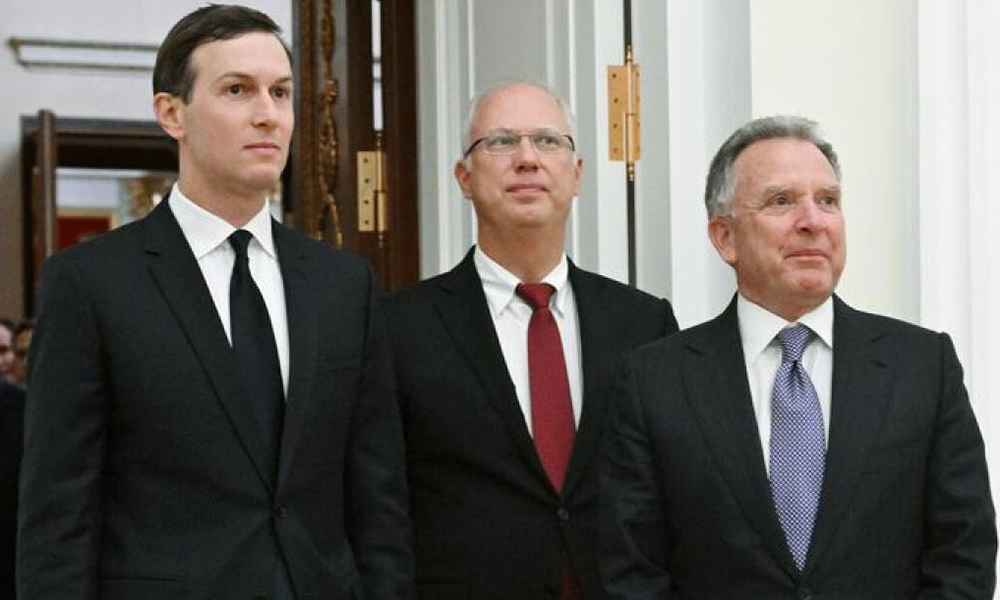
U.S. negotiators met Russian officials in Florida on Saturday for the latest talks aimed at ending Russia’s war in Ukraine, as President Donald Trump’s administration tries to coax an agreement out of both sides to end the conflict, Reuters reported.
The Miami meeting followed U.S. talks on Friday with Ukrainian and European officials, the latest discussions of a peace plan that has sparked some hope of a resolution to the conflict that began when Russia launched its full-scale invasion in February 2022.
Russian President Vladimir Putin’s special envoy Kirill Dmitriev told reporters after meeting U.S. special envoy Steve Witkoff and Trump’s son-in-law Jared Kushner that the talks were constructive and would continue on Sunday. A White House official said the talks had concluded for the day.
“The discussions are proceeding constructively. They began earlier and will continue today, and will also continue tomorrow,” Dmitriev said.
Marco Rubio, Trump’s top diplomat and national security advisor, had said he might also join the talks.
U.S., Ukrainian and European officials earlier this week reported progress on security guarantees for Kyiv as part of the talks to end the war, but it remains unclear if those terms will be acceptable to Moscow.
A Russian source told Reuters that any meeting between Dmitriev and the Ukrainian negotiators had been ruled out.
In Kyiv, Ukrainian President Volodymyr Zelenskiy said on Saturday that Ukraine would back a U.S. proposal for three-sided talks with the United States and Russia if it facilitated more exchanges of prisoners and paved the way for meetings of national leaders.
“America is now proposing a trilateral meeting with national security advisers — America Ukraine, Russia,” Zelenskiy told local journalists in Kyiv.
U.S. intelligence reports continue to warn that Putin intends to capture all of Ukraine, sources familiar with the intelligence said, contradicting some U.S. officials’ assertions that Moscow is ready for peace.
Putin offered no compromise during his annual press conference in Moscow, insisting that Russia’s terms for ending the war had not changed since June 2024, when he demanded Ukraine abandon its ambition to join NATO and withdraw entirely from four Ukrainian regions Russia claims as its own territory, Reuters reported.
Kyiv says it will not cede land that Moscow’s forces have failed to capture in nearly four years of war.
Ukraine’s top negotiator Rustem Umerov said U.S. and European teams on Friday held talks and agreed to pursue their joint efforts.
“We agreed with our American partners on further steps and on continuing our joint work in the near future,” Umerov wrote on Telegram of the discussions in the United States, adding that he had informed Zelenskiy of the outcome of the talks.
The White House did not immediately respond to a request for comment.
Rubio told reporters on Friday that progress has been made in discussions to end the war but there is still a way to go.
“The role we’re trying to play is a role of figuring out whether there’s any overlap here that they can agree to, and that’s what we’ve invested a lot of time and energy and continue to do so. That may not be possible. I hope it is. I hope it can get done this month before the end of the year.”
World
US hits Daesh in Syria with large retaliatory strikes, officials say
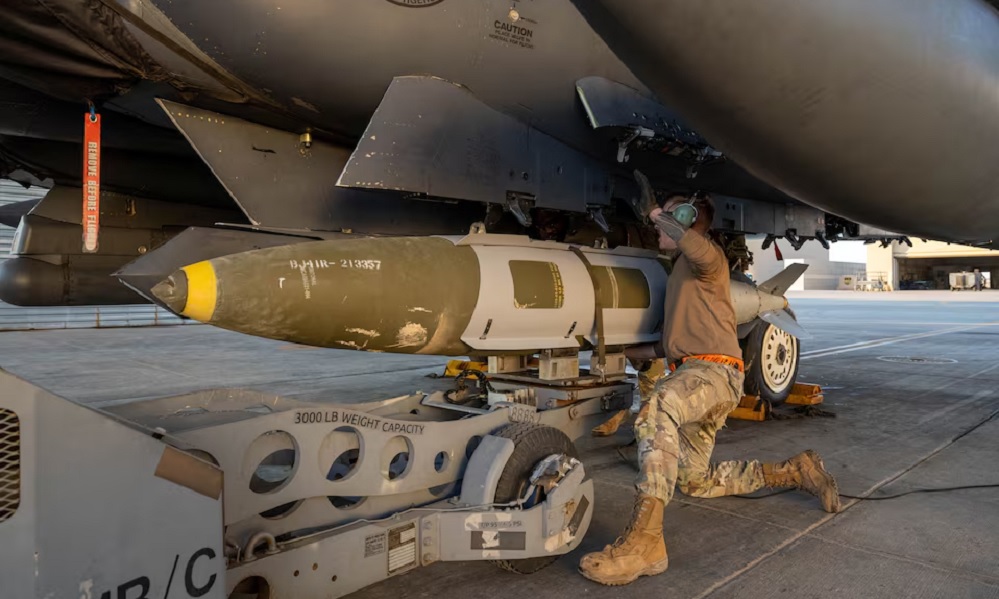
The U.S. military launched large-scale strikes against dozens of Daesh targets in Syria on Friday in retaliation for an attack on American personnel, U.S. officials said.
A U.S.-led coalition has been carrying out airstrikes and ground operations in Syria targeting Islamic State suspects in recent months, often with the involvement of Syria’s security forces, Reuters reported.
President Donald Trump had vowed to retaliate after a suspected ISIS attack killed U.S. personnel last weekend in Syria.
Defense Secretary Pete Hegseth said the strikes targeted “ISIS fighters, infrastructure, and weapons sites” and that the operation was “OPERATION HAWKEYE STRIKE.”
“This is not the beginning of a war — it is a declaration of vengeance,” Hegseth said. “Today, we hunted and we killed our enemies. Lots of them. And we will continue,” he added.
Trump said on social media that the Syrian government fully supported the strikes and that the U.S. was inflicting “very serious retaliation.”
U.S. Central Command said the strikes hit more than 70 targets across central Syria, adding that Jordanian fighter jets supported the operation.
One U.S. official said the strikes were carried out by U.S. F-15 and A-10 jets, along with Apache helicopters and HIMARS rocket systems.
Syria reiterated its steadfast commitment to fighting Daesh and ensuring that it has “no safe havens on Syrian territory,” according to a statement by the foreign ministry.
Two U.S. Army soldiers and a civilian interpreter were killed on Saturday in the central Syrian town of Palmyra by an attacker who targeted a convoy of American and Syrian forces before being shot dead, according to the U.S. military. Three other U.S. soldiers were also wounded in the attack.
About 1,000 U.S. troops remain in Syria.
The Syrian Interior Ministry has described the attacker as a member of the Syrian security forces suspected of sympathizing with Daesh.
Syria’s government is led by former rebels who toppled leader Bashar al-Assad last year after a 13-year civil war, and includes members of Syria’s former Al Qaeda branch who broke with the group and clashed with Daesh.
Syria has been cooperating with a U.S.-led coalition against Daesh, reaching an agreement last month when President Ahmed al-Sharaa visited the White House.
World
EU leaders agree joint borrowing to fund Ukraine, setting aside plan to use Russian frozen assets

European Union leaders decided on Friday to borrow cash to fund Ukraine’s defence against Russia for the next two years rather than use frozen Russian assets, sidestepping divisions over an unprecedented plan to finance Kyiv with Russian sovereign cash.
“Today we approved a decision to provide 90 billion euros to Ukraine,” EU summit chairman Antonio Costa told a news conference early on Friday morning after hours of talks among the leaders in Brussels, Reuters reported. “As a matter of urgency, we will provide a loan backed by the European Union budget.”
The leaders also gave the European Commission a mandate to keep working on a so-called reparations loan based on Russian immobilised assets but that option proved unworkable for now, above all due to resistance from Belgium, where the bulk of the assets is held.
The idea of EU borrowing initially seemed unworkable as it requires unanimity and Hungary’s Russia-friendly Prime Minister Viktor Orban had opposed it. But Hungary, Slovakia and the Czech Republic agreed to let the scheme go ahead as long as it did not impact them financially.
The EU leaders said Russian assets, totalling 210 billion euros in the EU, will remain frozen until Moscow pays war reparations to Ukraine. If Moscow ever takes such a step, Ukraine could then use they money to pay back the loan.
USE OF RUSSIAN ASSETS TO COMPLEX AT THIS STAGE
“This is good news for Ukraine and bad news for Russia and this was our intention,” German Chancellor Friedrich Merz said.
The stakes for finding money for Kyiv were high because without the EU’s financial help, Ukraine would run out of money in the second quarter of next year and most likely lose the war to Russia, which the EU fears would bring closer the threat of Russian aggression against the bloc.
The decision follows hours of discussions among leaders on the technical details of an unprecedented loan based on the frozen Russian assets, which turned out to be too complex or politically demanding to resolve at this stage.
The main difficulty was providing Belgium, where 185 billion euros of the total Russian assets in Europe are held, with sufficient guarantees against financial and legal risks from potential Russian retaliation for the release of the money to Ukraine.
“There were so many questions on the Reparations Loan, we had to go to Plan B. Rationality has prevailed,” Belgian Prime Minister Bart De Wever told a news conference. “The EU has avoided chaos and division and remained united,” he said.
HUNGARY SCORES A WIN
With public finances across the EU already strained by high debt levels, the European Commission had proposed using the Russian assets for a loan to Kyiv or joint borrowing against the EU budget.
Using the latter option allowed Orban to claim a diplomatic victory.
“Orban got what he wanted: no reparation loan. And EU action without participation of Hungary, Czech Republic and Slovakia,” one EU diplomat said.
‘CAN’T AFFORD TO FAIL’
Several EU leaders arriving at the summit said it was imperative they find a solution to keep Ukraine financed and fighting for the next two years. They were also keen to show European countries’ strength and resolve after U.S. President Donald Trump last week called them “weak”.
“We just can’t afford to fail,” EU foreign policy chief Kaja Kallas said.
Ukrainian President Volodymyr Zelenskiy, who took part in the summit, urged the bloc to agree to use the Russian assets to provide the funds he said would allow Ukraine to keep fighting.
“The decision now on the table – the decision to fully use Russian assets to defend against Russian aggression – is one of the clearest and most morally justified decisions that could ever be made,” he said.
-

 International Sports5 days ago
International Sports5 days agoIPL 2026: Teams take shape after auction as franchises balance star power and depth
-

 International Sports4 days ago
International Sports4 days agoILT20: Abu Dhabi Knight Riders end Desert Vipers’ unbeaten run in dramatic one-run win
-

 Latest News2 days ago
Latest News2 days agoAfghan border forces prevent illegal entry of hundreds into Iran
-
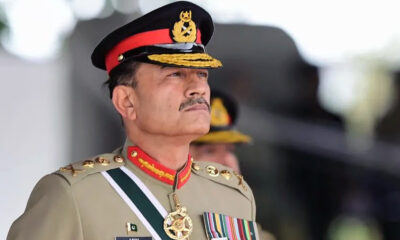
 Regional5 days ago
Regional5 days agoPakistan’s military chief Asim Munir in spotlight over Trump’s Gaza plan
-

 Latest News2 days ago
Latest News2 days agoPakistan summons Afghan diplomat over deadly attack in North Waziristan
-

 Business4 days ago
Business4 days agoMahirood Customs leads Iran’s exports to Afghanistan
-

 World5 days ago
World5 days agoTrump adds seven countries, including Syria, to full travel ban list
-
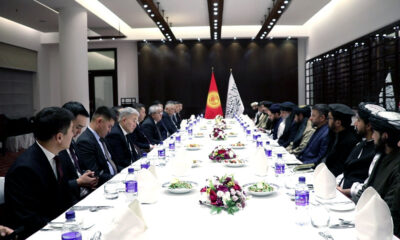
 Latest News4 days ago
Latest News4 days agoAfghanistan, Kyrgyzstan discuss expanding trade and economic cooperation








